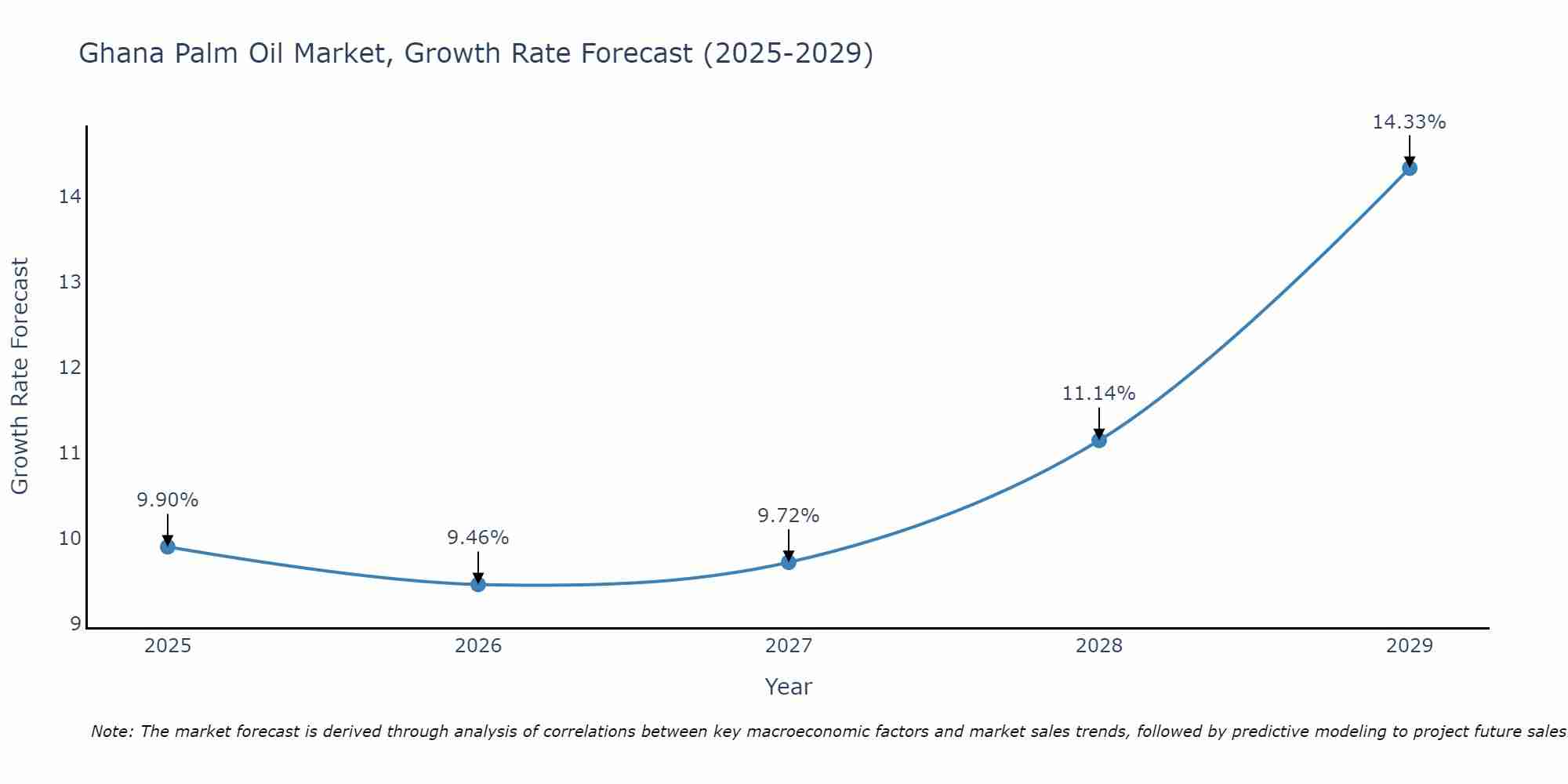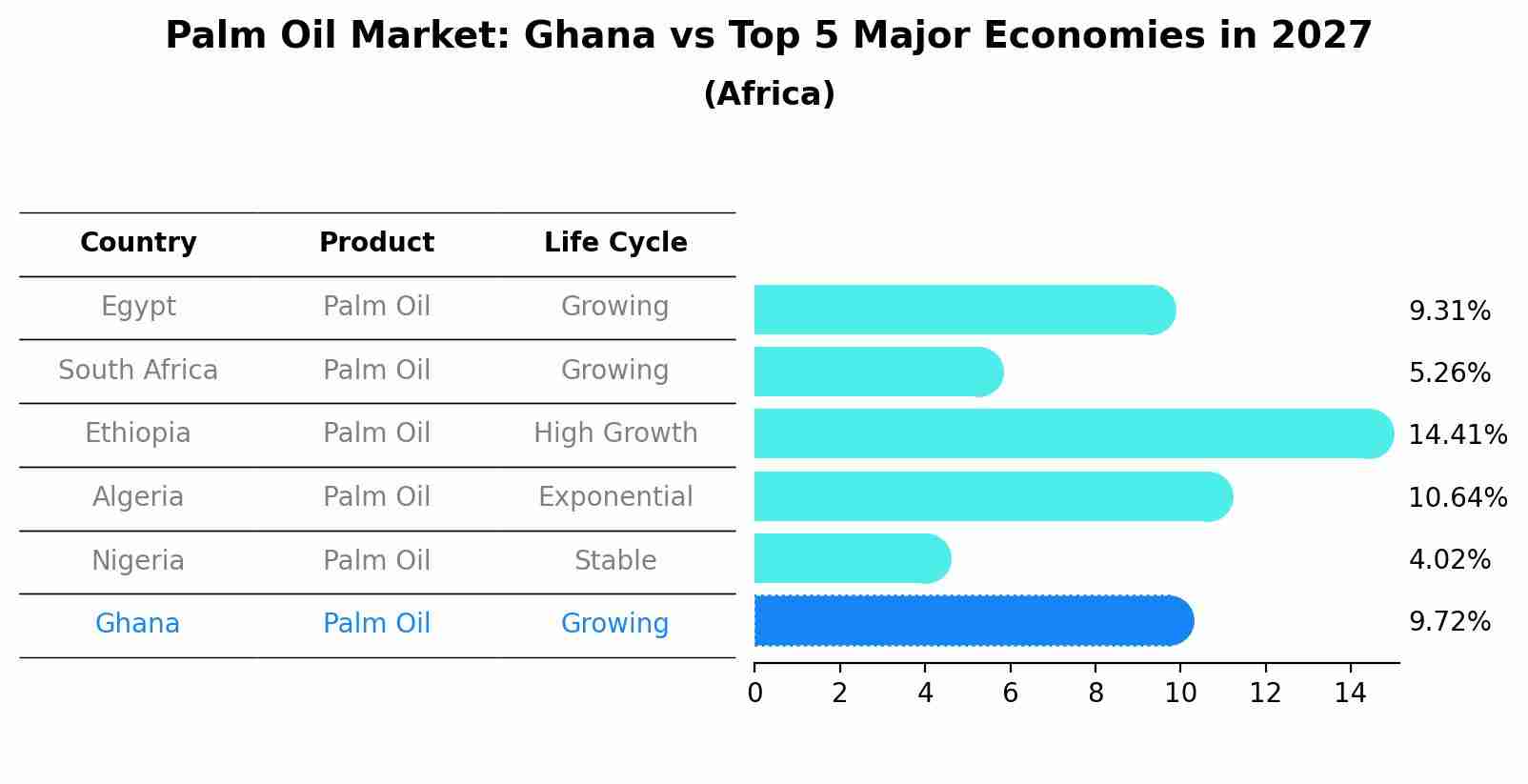Ghana Palm Oil Market (2025-2031) Outlook | Revenue, Growth, Industry, Analysis, Share, Companies, Value, Forecast, Size & Trends
| Product Code: ETC383816 | Publication Date: Aug 2022 | Updated Date: Jul 2025 | Product Type: Market Research Report | |
| Publisher: 6Wresearch | Author: Ravi Bhandari | No. of Pages: 75 | No. of Figures: 35 | No. of Tables: 20 |
Ghana Palm Oil Market Size Growth Rate
The Ghana Palm Oil Market is projected to witness mixed growth rate patterns during 2025 to 2029. Commencing at 9.90% in 2025, growth builds up to 14.33% by 2029.

Palm Oil Market: Ghana vs Top 5 Major Economies in 2027 (Africa)
The Palm Oil market in Ghana is projected to grow at a growing growth rate of 9.72% by 2027, highlighting the country's increasing focus on advanced technologies within the Africa region, where Egypt holds the dominant position, followed closely by South Africa, Ethiopia, Algeria and Nigeria, shaping overall regional demand.

Ghana Palm Oil Market Synopsis
The Ghana palm oil market is a significant sector of the country`s economy, with palm oil being a staple ingredient in local cuisine and a key export commodity. The market is characterized by a mix of small-scale farmers and large plantations, with production mainly concentrated in the southern regions of the country. Ghana is a net importer of palm oil due to high domestic demand, but efforts are being made to increase local production through government support and initiatives to improve productivity and sustainability practices. The market is competitive, with both local and international players involved in processing, distribution, and export activities. Consumer preferences for sustainably sourced and certified palm oil are also driving market dynamics, pushing companies to adopt more responsible practices.
Ghana Palm Oil Market Trends
The Ghana Palm Oil Market is experiencing growth driven by increasing demand both domestically and internationally. Consumers are increasingly opting for palm oil due to its versatility in cooking, cosmetics, and as a biofuel. The market is also benefiting from the rising popularity of sustainable and organic palm oil products, with consumers becoming more conscious of the environmental and social impact of their purchases. Additionally, government initiatives to support local palm oil production and exports are further driving market growth. However, challenges such as fluctuating global palm oil prices, climate change impacts on palm oil production, and competition from other vegetable oils remain key factors influencing the market. Overall, the Ghana Palm Oil Market is poised for continued expansion with a focus on sustainability and quality.
Ghana Palm Oil Market Challenges
In the Ghana Palm Oil Market, challenges include fluctuating global palm oil prices impacting local producers` profitability, inadequate infrastructure hindering efficient production and distribution, lack of access to modern farming techniques leading to low productivity levels, and issues related to deforestation and environmental sustainability. Additionally, competition from cheaper imported palm oil products can pose a threat to domestic producers. Addressing these challenges requires strategic government interventions to support local farmers, improve infrastructure, promote sustainable production practices, and enhance market access for Ghanaian palm oil products both domestically and internationally.
Ghana Palm Oil Market Investment Opportunities
Investment opportunities in the Ghana Palm Oil Market include the cultivation and processing of palm oil, as Ghana is one of the largest producers of palm oil in Africa. Investors can consider investing in palm oil plantations, small-scale processing facilities, or partnering with local farmers for sourcing raw materials. Additionally, there is a growing demand for sustainable and ethically produced palm oil in international markets, presenting an opportunity for investments in certification programs such as RSPO (Roundtable on Sustainable Palm Oil). With the government`s support for the palm oil industry through policies and incentives, investing in the Ghana Palm Oil Market can provide attractive returns for investors looking to capitalize on the country`s natural resources and increasing global demand for palm oil products.
Jordan Agar Market Government Policies
The government of Ghana has implemented various policies related to the palm oil market to promote sustainable production and ensure environmental conservation. Some key policies include the National Oil Palm Development Strategy, which aims to increase palm oil production through the establishment of new plantations and the rehabilitation of existing ones. The government also introduced the Sustainable West Africa Palm Oil Program to encourage responsible palm oil production practices and certification. Additionally, there are regulations in place to prevent deforestation and encourage smallholder participation in the industry. Overall, these policies reflect Ghana`s commitment to balancing economic growth in the palm oil sector with environmental protection and social responsibility.
Ghana Palm Oil Market Future Outlook
The Ghana palm oil market is expected to show steady growth in the coming years due to increasing demand from various industries such as food processing, cosmetics, and biofuels. Factors driving this growth include the rising population, urbanization, and changing consumer preferences towards healthier products. Additionally, government initiatives to promote sustainable palm oil production practices and increase local processing capacity are likely to further boost the market. However, challenges such as land use conflicts, environmental concerns, and potential volatility in global palm oil prices could impact the market`s growth trajectory. Overall, the Ghana palm oil market is forecasted to expand, driven by both domestic consumption and export opportunities, as long as sustainable practices and regulatory frameworks are effectively implemented.
Key Highlights of the Report:
- Ghana Palm Oil Market Outlook
- Market Size of Ghana Palm Oil Market, 2024
- Forecast of Ghana Palm Oil Market, 2031
- Historical Data and Forecast of Ghana Palm Oil Revenues & Volume for the Period 2021 - 2031
- Ghana Palm Oil Market Trend Evolution
- Ghana Palm Oil Market Drivers and Challenges
- Ghana Palm Oil Price Trends
- Ghana Palm Oil Porter's Five Forces
- Ghana Palm Oil Industry Life Cycle
- Historical Data and Forecast of Ghana Palm Oil Market Revenues & Volume By Nature for the Period 2021 - 2031
- Historical Data and Forecast of Ghana Palm Oil Market Revenues & Volume By Organic for the Period 2021 - 2031
- Historical Data and Forecast of Ghana Palm Oil Market Revenues & Volume By Conventional for the Period 2021 - 2031
- Historical Data and Forecast of Ghana Palm Oil Market Revenues & Volume By Product for the Period 2021 - 2031
- Historical Data and Forecast of Ghana Palm Oil Market Revenues & Volume By CPO for the Period 2021 - 2031
- Historical Data and Forecast of Ghana Palm Oil Market Revenues & Volume By RBD Palm Oil for the Period 2021 - 2031
- Historical Data and Forecast of Ghana Palm Oil Market Revenues & Volume By Palm Kernel Oil for the Period 2021 - 2031
- Historical Data and Forecast of Ghana Palm Oil Market Revenues & Volume By Fractionated Palm Oil for the Period 2021 - 2031
- Historical Data and Forecast of Ghana Palm Oil Market Revenues & Volume By End-use for the Period 2021 - 2031
- Historical Data and Forecast of Ghana Palm Oil Market Revenues & Volume By Food & Beverage for the Period 2021 - 2031
- Historical Data and Forecast of Ghana Palm Oil Market Revenues & Volume By Personal Care & Cosmetics for the Period 2021 - 2031
- Historical Data and Forecast of Ghana Palm Oil Market Revenues & Volume By Biofuel & Energy for the Period 2021 - 2031
- Historical Data and Forecast of Ghana Palm Oil Market Revenues & Volume By Pharmaceuticals for the Period 2021 - 2031
- Historical Data and Forecast of Ghana Palm Oil Market Revenues & Volume By Others for the Period 2021 - 2031
- Ghana Palm Oil Import Export Trade Statistics
- Market Opportunity Assessment By Nature
- Market Opportunity Assessment By Product
- Market Opportunity Assessment By End-use
- Ghana Palm Oil Top Companies Market Share
- Ghana Palm Oil Competitive Benchmarking By Technical and Operational Parameters
- Ghana Palm Oil Company Profiles
- Ghana Palm Oil Key Strategic Recommendations
Frequently Asked Questions About the Market Study (FAQs):
- Single User License$ 1,995
- Department License$ 2,400
- Site License$ 3,120
- Global License$ 3,795
Search
Thought Leadership and Analyst Meet
Our Clients
Related Reports
- Afghanistan Rocking Chairs And Adirondack Chairs Market (2026-2032) | Size & Revenue, Competitive Landscape, Share, Segmentation, Industry, Value, Outlook, Analysis, Trends, Growth, Forecast, Companies
- Afghanistan Apparel Market (2026-2032) | Growth, Outlook, Industry, Segmentation, Forecast, Size, Companies, Trends, Value, Share, Analysis & Revenue
- Canada Oil and Gas Market (2026-2032) | Share, Segmentation, Value, Industry, Trends, Forecast, Analysis, Size & Revenue, Growth, Competitive Landscape, Outlook, Companies
- Germany Breakfast Food Market (2026-2032) | Industry, Share, Growth, Size, Companies, Value, Analysis, Revenue, Trends, Forecast & Outlook
- Australia Briquette Market (2025-2031) | Growth, Size, Revenue, Forecast, Analysis, Trends, Value, Share, Industry & Companies
- Vietnam System Integrator Market (2025-2031) | Size, Companies, Analysis, Industry, Value, Forecast, Growth, Trends, Revenue & Share
- ASEAN and Thailand Brain Health Supplements Market (2025-2031) | Strategy, Consumer Insights, Analysis, Investment Trends, Opportunities, Growth, Size, Share, Industry, Revenue, Segments, Value, Segmentation, Supply, Forecast, Restraints, Outlook, Competition, Drivers, Trends, Demand, Pricing Analysis, Competitive, Strategic Insights, Companies, Challenges
- ASEAN Bearings Market (2025-2031) | Strategy, Consumer Insights, Analysis, Investment Trends, Opportunities, Growth, Size, Share, Industry, Revenue, Segments, Value, Segmentation, Supply, Forecast, Restraints, Outlook, Competition, Drivers, Trends, Demand, Pricing Analysis, Competitive, Strategic Insights, Companies, Challenges
- Europe Flooring Market (2025-2031) | Outlook, Share, Industry, Trends, Forecast, Companies, Revenue, Size, Analysis, Growth & Value
- Saudi Arabia Manlift Market (2025-2031) | Outlook, Size, Growth, Trends, Companies, Industry, Revenue, Value, Share, Forecast & Analysis
Industry Events and Analyst Meet
Whitepaper
- Middle East & Africa Commercial Security Market Click here to view more.
- Middle East & Africa Fire Safety Systems & Equipment Market Click here to view more.
- GCC Drone Market Click here to view more.
- Middle East Lighting Fixture Market Click here to view more.
- GCC Physical & Perimeter Security Market Click here to view more.
6WResearch In News
- Doha a strategic location for EV manufacturing hub: IPA Qatar
- Demand for luxury TVs surging in the GCC, says Samsung
- Empowering Growth: The Thriving Journey of Bangladesh’s Cable Industry
- Demand for luxury TVs surging in the GCC, says Samsung
- Video call with a traditional healer? Once unthinkable, it’s now common in South Africa
- Intelligent Buildings To Smooth GCC’s Path To Net Zero


















